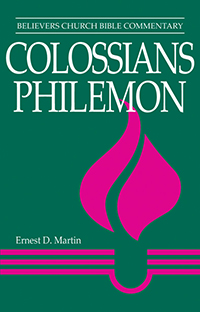Slavery (In Colossians and Philemon)
![]() Home A B C D E F G H I J K L M N O P Q R S T U V W X Y Z Abbreviations Glossary
Home A B C D E F G H I J K L M N O P Q R S T U V W X Y Z Abbreviations Glossary
Slavery has been a fact of life for much of human history. By definition, a slave is a person who is the property of another person. Slavery was a conspicuous feature of the world of the NT era. Estimates of the numbers of slaves and the percentage of slaves in the Roman Empire vary greatly because no comprehensive figures are available. Conservative estimates put the ratio at one slave for every three to five free persons. But evidence exists that in some areas the number of slaves far exceeded the free population. William Barclay's undocumented estimate is 60,000,000 slaves in the Roman Empire (1975b:270). The slaves of that era were predominately Caucasian. Sources of slaves included kidnapping, sale of slaves in border areas, indebtedness, self-sale, children of female slaves, and military captives. In peacetime, when military conquest and piracy supplied few slaves, a primary source was homebred slaves.
Slaves had almost no legal rights. Their lives were in the hands of their owners. They were not permitted legal marriage, although common-law arrangements were allowed. Slaves had no legal rights over the children born to them. They worked in labor gangs in mines and fields and served in all kinds of ways in households. Since much work was relegated to slaves, it came to be regarded as demeaning. Idleness and ease resulted in increased sensuality, and slaves were subjected to the worst passions of the masters and their families. Masters and mistresses had absolute power over their slaves, to order, sexually use, abuse, punish, and even kill them. How they fared depended on the kindness or callousness of their owners. Evidence of extreme cruelty to slaves is matched by evidence of movement toward improved treatment. Since they were considered nonpersons, merely chattel and tools, the gospel of Christ was unbelievably good news for them.
The Hebrews had practiced slavery for centuries with considerable humanizing restraints, compared with Greek and Roman rules. The laws of Moses governed slavery, not the least of which was the Jubilee provision of setting slaves free every seven years. The Israelites were reminded that they had once been slaves in Egypt and that Yahweh had set them free. (Representative texts include Exod. 21:1-11; Lev. 25:39-55; Jer. 34:8-22.)
Slaves were responding to the gospel and becoming part of the churches that sprang up across the empire. Percentages are impossible to determine. The presence of both slaves and masters in a congregation, irrespective of numbers, brought the church face to face with the dynamics of the slave system.
A runaway slave could expect to find temporary sanctuary in a household, at least in some parts of the empire. However, a fugitive was to be reported to the master. Harboring someone else's slave indefinitely was an offense against the owner, and the one harboring the slave could be held liable for the lost time (cf. Martin, 1978:144-147). The law also allowed for selling the slave and forwarding the money to the owner. Although severe punish ment was the usual rule for returned runaways, Paul mentions nothing about punishment for Onesimus, and Philem. 15-21 implies that there will be none if Paul's appeal to Philemon is effective.
In general the NT assumes the practice of slavery. Certainly the teaching about equality in Christ addresses the relationship of slaves and master in the church. Slave trading is listed as an unholy and profane practice in 1 Tim. 1:9-11 (cf. Rev. 18:13). Following the NT era, church leaders insisted on humane treatment of slaves and encouraged Christians to free their slaves. The Essenes openly denounced slavery and refused to own slaves (Philo, Every Good Man Is Free 12.79; IDB, 1976:831, "Slavery in the NT"). An example of compromise with the social system in the fourth century is found in the Apostolic Canons (canon 82):
We do not permit slaves to be ordained to the clergy without their masters' consent; for this would wrong those that owned them. For such a practice would occasion the subversion of families. But if at any time a servant appears worthy to be ordained to a high office, such as Onesimus appears to have been, and if his master allows it, and gives him his freedom, and dismisses him free from his house, let him be ordained. (Ayer: 388)
The practice of slavery persisted in spite of the NT and teachings that followed:
Slavery was pervasive in ancient civilization. Early Christianity, by its teachings and actions, sought on balance to mitigate the abuses and inhumanity of the system, but it would be left mostly to later ages to realize fully the incompatibility of slavery with human rights and dignity and to seek its abolition. (McHugh: 855)
| —Ernest D. Martin |
